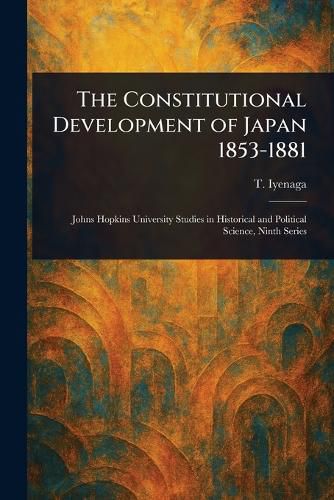Readings Newsletter
Become a Readings Member to make your shopping experience even easier.
Sign in or sign up for free!
You’re not far away from qualifying for FREE standard shipping within Australia
You’ve qualified for FREE standard shipping within Australia
The cart is loading…






This title is printed to order. This book may have been self-published. If so, we cannot guarantee the quality of the content. In the main most books will have gone through the editing process however some may not. We therefore suggest that you be aware of this before ordering this book. If in doubt check either the author or publisher’s details as we are unable to accept any returns unless they are faulty. Please contact us if you have any questions.
Explore the foundations of modern Japan with "The Constitutional Development of Japan 1863-1881" by Toyokichi Iyenaga. This meticulously researched study, part of the Johns Hopkins University Studies in Historical and Political Science, delves into the pivotal years following the Meiji Restoration.
Iyenaga traces the complex journey of Japan's constitutional history, examining the key political and governmental shifts that led to the creation of the Japanese Constitution. Readers interested in Japanese history, political science, and constitutional law will gain valuable insights into this transformative period.
This historical text provides a detailed account of the debates, influences, and compromises that shaped Japan's path toward constitutionalism. Discover the origins of Japan's modern governmental structure and its lasting impact. A vital resource for understanding the evolution of Japanese political thought and institutions.
This work has been selected by scholars as being culturally important, and is part of the knowledge base of civilization as we know it.
This work is in the public domain in the United States of America, and possibly other nations. Within the United States, you may freely copy and distribute this work, as no entity (individual or corporate) has a copyright on the body of the work.
Scholars believe, and we concur, that this work is important enough to be preserved, reproduced, and made generally available to the public. We appreciate your support of the preservation process, and thank you for being an important part of keeping this knowledge alive and relevant.
$9.00 standard shipping within Australia
FREE standard shipping within Australia for orders over $100.00
Express & International shipping calculated at checkout
This title is printed to order. This book may have been self-published. If so, we cannot guarantee the quality of the content. In the main most books will have gone through the editing process however some may not. We therefore suggest that you be aware of this before ordering this book. If in doubt check either the author or publisher’s details as we are unable to accept any returns unless they are faulty. Please contact us if you have any questions.
Explore the foundations of modern Japan with "The Constitutional Development of Japan 1863-1881" by Toyokichi Iyenaga. This meticulously researched study, part of the Johns Hopkins University Studies in Historical and Political Science, delves into the pivotal years following the Meiji Restoration.
Iyenaga traces the complex journey of Japan's constitutional history, examining the key political and governmental shifts that led to the creation of the Japanese Constitution. Readers interested in Japanese history, political science, and constitutional law will gain valuable insights into this transformative period.
This historical text provides a detailed account of the debates, influences, and compromises that shaped Japan's path toward constitutionalism. Discover the origins of Japan's modern governmental structure and its lasting impact. A vital resource for understanding the evolution of Japanese political thought and institutions.
This work has been selected by scholars as being culturally important, and is part of the knowledge base of civilization as we know it.
This work is in the public domain in the United States of America, and possibly other nations. Within the United States, you may freely copy and distribute this work, as no entity (individual or corporate) has a copyright on the body of the work.
Scholars believe, and we concur, that this work is important enough to be preserved, reproduced, and made generally available to the public. We appreciate your support of the preservation process, and thank you for being an important part of keeping this knowledge alive and relevant.